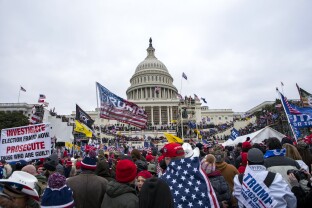The Supreme Court put many of the felony charges stemming from the Jan. 6, 2021, assault on the U.S. Capitol in doubt in a 6-3 ruling on Friday by significantly narrowing the scope of a law used against hundreds of criminal defendants.
The decision determined that an obstruction law passed after a corporate accounting scandal is applicable only in the context of tampering with or removing documents and other records. Depending on what plays out in the lower courts, it could take away a potent tool that prosecutors have used liberally against many of the Jan. 6 rioters and force the resentencing of some defendants already convicted under a broader reading of the statute.
Most of the Capitol riot defendants have been charged with misdemeanors like entering or remaining in a restricted area. But in at least 350 cases, prosecutors have relied on a felony charge that criminalizes corruptly obstructing or impeding an official proceeding. Adding this felony charge carries the possibility of up to two decades in prison as a maximum sentence.
The government’s use of the charge against any disruption of official proceedings — such as court hearings or congressional debates — “would criminalize a broad swath of prosaic conduct, exposing activists and lobbyists alike to decades in prison” for routine protests, the majority wrote.
The majority opinion was written by Chief Justice John Roberts. It strayed slightly from the traditional conservative-liberal split: Democrat-appointed Justice Ketanji Brown Jackson was part of the majority, while Republican-appointed Justice Amy Coney Barrett penned the dissent, joined by Justices Elena Kagan and Sonia Sotomayor.
In their dissenting opinion, the justices in the minority acknowledged the law was “an expansive statute” but said it was for Congress to decide how to write laws and the prosecutors in the executive branch to decide how they are applied, not the courts. By narrowing the obstruction law, “the Court has failed to respect the prerogatives of the political branches,” they argued.
The case now heads back to the D.C. Circuit Court, where it will be decided with the Supreme Court’s narrower interpretation of the law. The lower courts will have to decide whether the conduct of the petitioners and scores of other Jan. 6 defendants fit the newly narrowed application of the obstruction law.
The three petitioners in the case — Joseph Fischer, Edward Lang and Garret Miller — were charged with obstructing an official proceeding, among other things, for their actions on Jan. 6. Fischer allegedly egged on rioters by shouting “charge,” made physical conduct with a police officer and texted acquaintances before the riot that he wanted to take Congress to the gallows. Lang allegedly assaulted numerous officers, while Miller traveled to D.C. carrying a grappling hook, rope, bulletproof vest and mouthguard in anticipation of “crazy shit,” including the start of a civil war.
The Supreme Court’s decision could also have implications for former President Donald Trump, who is also being charged under the obstruction of an official proceeding law. However, special counsel Jack Smith, who brought the charges against Trump, has argued that even under a narrowed reading of the law, Trump impeded Congress’ counting of the electoral vote certificates, and allies tried to introduce their own phony electoral certification — all of which relates to documents and records.
Prosecutors could attempt to make a similar argument in the lower courts in reference to other Jan. 6 defendants: namely that they stormed the Capitol during a proceeding that involved the receipt and acceptance of official documents. Jackson, who joined the conservative justices in the majority, suggested that as a potential path forward in a separate concurring opinion.
The ceremonial meeting of Congress on Jan. 6 “plainly used certain records, documents, or objects — including, among others, those relating to the electoral votes themselves,” Jackson wrote. “If so, then Fischer’s prosecution under [the obstruction statute] can, and should, proceed. That issue remains available for the lower courts to determine on remand.”
—
Byron Tau is a reporter at NOTUS. Calen Razor is a NOTUS reporter and an Allbritton Journalism Institute fellow.
Sign in
Log into your free account with your email. Don’t have one?
Check your email for a one-time code.
We sent a 4-digit code to . Enter the pin to confirm your account.
New code will be available in 1:00
Let’s try this again.
We encountered an error with the passcode sent to . Please reenter your email.


